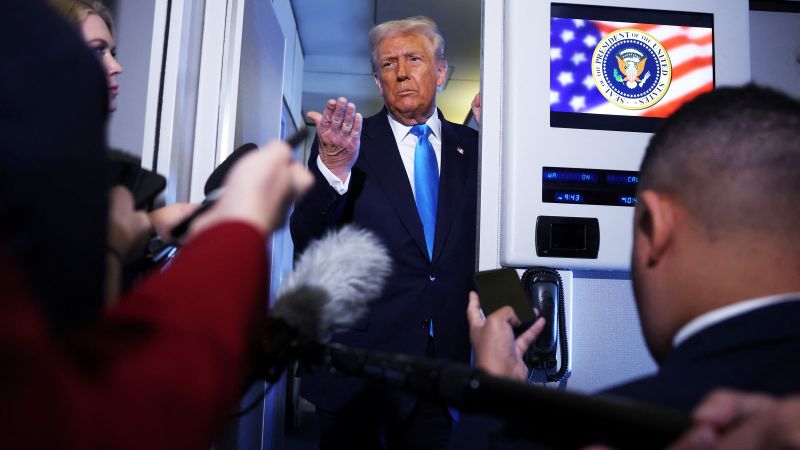Listen to the article
In a rare moment of constitutional clarity, President Donald Trump acknowledged Tuesday that he cannot seek a third term in the White House, stating that “if you read it, it’s pretty clear I’m not allowed to run.” However, his accompanying claims about his popularity contain significant factual inaccuracies that contradict available polling data.
Trump asserted that he currently enjoys his “highest poll numbers that I’ve ever had” and claimed to have “the best numbers for any president in many years.” Both statements are demonstrably false according to multiple polling aggregators and historical presidential approval ratings.
Current polling averages show Trump’s approval ratings have actually declined substantially since taking office in January. The New York Times polling average places Trump at a net negative-11 points as of Tuesday, with 43% approval and 54% disapproval. This represents a dramatic 20-point net decline from the first week of his term, when he enjoyed positive-9 net approval (52% approval, 43% disapproval).
CNN’s Poll of Polls tells a similar story, showing Trump with negative-15 net approval (41% approval, 56% disapproval) as of Wednesday. This reflects a 14-point net drop since early February.
Other respected polling aggregates confirm this downward trend. G. Elliott Morris, co-founder of FiftyPlusOne.news, calculates Trump’s net approval at approximately negative-14 points, down about 26 net points since the term began. Data journalist Nate Silver’s average shows negative-10 points, a 22-point decline from January.
When the White House was asked to comment on these discrepancies, they did not respond to CNN’s request.
While Trump does maintain strong support among Republicans, often polling around 90% approval within his party, this hardly constitutes his “highest poll numbers ever” overall. Even within his party base, he is not at a personal record high.
Trump’s assertion about having “the best numbers for any president in many years” is perhaps his most easily refuted claim. Historical polling shows that every modern president reached significantly higher approval peaks during their tenures. President Barack Obama achieved 69% approval early in his first term, President George W. Bush reached an extraordinary 90% following September 11, 2001, and even President Joe Biden, who struggled with low ratings through much of his presidency, reached 57% approval in both January and April 2021.
Even when comparing presidents at identical points in their terms, Trump’s claim fails to stand up. According to Nate Silver’s historical tracking, on the date Trump made his claim while having approximately negative-10 net approval, his predecessors were faring much better: Obama had about positive-9 net approval in his first term, George W. Bush approximately positive-76, Bill Clinton positive-2, George H.W. Bush about positive-38, Ronald Reagan around positive-20, and Jimmy Carter approximately positive-24.
The pattern continues further back, with Richard Nixon at about positive-27, John F. Kennedy approximately positive-65, Dwight D. Eisenhower around positive-45, and Harry Truman about positive-41.
Some might note that Trump is serving a non-consecutive second term, which creates a different comparison point. However, even accounting for this, Gallup’s quarterly presidential approval tracking shows that, with the exception of Nixon, Trump had lower average approval in his 19th quarter as president than any two-term president since at least Eisenhower in the 1950s.
These findings highlight a significant disconnect between Trump’s perception of his popularity and the measurable reality reflected in diverse polling sources, raising questions about the information bubble surrounding the president.
Verify This Yourself
Use these professional tools to fact-check and investigate claims independently
Reverse Image Search
Check if this image has been used elsewhere or in different contexts
Ask Our AI About This Claim
Get instant answers with web-powered AI analysis
Related Fact-Checks
See what other fact-checkers have said about similar claims
Want More Verification Tools?
Access our full suite of professional disinformation monitoring and investigation tools




9 Comments
The mining and energy sectors are closely tied to policy decisions, so it’s important to understand the political landscape. This fact-check provides useful context on the current state of presidential approval ratings.
Absolutely. Monitoring these trends can help industry participants anticipate potential policy changes and adjust their strategies accordingly. Fact-checking helps cut through the noise and focus on the relevant data.
This fact-check highlights the value of having multiple, reputable polling sources to cross-reference. It’s concerning when a leader makes claims that are so clearly at odds with the available data. Maintaining trust in democratic institutions is crucial.
I agree. Independent, nonpartisan fact-checking is essential for holding our elected officials accountable and ensuring the public has access to accurate information, rather than relying on unsubstantiated claims.
The mining and commodities sectors are closely watched, given their importance to the global economy. I’m curious to see how the trends in Trump’s approval ratings might impact investor sentiment and policies towards these industries.
That’s a good point. Fluctuations in presidential approval can have ripple effects across different economic sectors. It will be interesting to monitor how this plays out, especially for industries like mining that are sensitive to policy changes.
Interesting to see a fact-check on Trump’s claims about poll numbers. The data seems to show a clear decline in his approval ratings since taking office, contrary to his assertions. I wonder what the root causes are for this decline.
Yes, it’s important to hold leaders accountable and scrutinize their public statements, especially when they contradict available data. Fact-checking helps ensure the public has an accurate understanding of the political landscape.
While I’m generally skeptical of political rhetoric, I appreciate the effort to objectively examine the president’s statements against available polling data. Maintaining an informed, fact-based public discourse is vital for a healthy democracy.